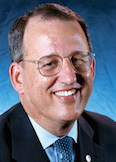Carolina's Soul
Posted on Jan. 15, 2006A recent update presented to the Board of Trustees about Carolina’s progress on becoming the nation’s “leading public university” — as reflected in the University’s progress on carefully selected “measures of excellence” — prompted me to recall a meeting of UNC’s Board of Visitors several years ago and the provocative comments made by one particular board member.

Doug Dibbert ’70
GAA Treasurer and N.C. Senate Majority Leader Tony Rand ’61 listened attentively as administrator after administrator extolled Carolina’s many impressive accomplishments. He respectfully asked that board members be told more about “Carolina’s soul.” He went on to explain that, while he and most alumni expect and want Carolina always to seek excellence indicators that can be viewed in empirical data, he believed that Carolina’s competitive advantage has always been its unique and special mission, which defines “Carolina’s soul.”
Born in the 18th century, Carolina grew, closed and reopened in the 19th century and expanded into a widely respected public research institution in the 20th century. Now in the 21st century, Carolina competes internationally. But the “Carolina soul” to which Rand made reference is the University that UNC President Edward Kidder Graham (class of 1898) reached out to nearly a century ago, when he called upon North Carolinians to “send us your problems.”
It is not boasting to observe that no other university has the special relationship with the people of its state that Carolina has enjoyed these many years. North Carolinians are as proud of this place as our University’s faculty, staff, students and alumni are. Each of North Carolina’s 100 counties is served by our ever-expanding menu of programs delivered by, among others, the schools of government, social work, education, public health, nursing, pharmacy, dentistry, medicine, law, business, journalism and mass communication, library and information sciences; UNC’s Area Health Education Centers; the Lineberger Comprehensive Cancer Center; the Carolina Center for Public Service; the College of Arts and Sciences; and our many institutes and centers.
North Carolinians overwhelmingly respect and value our University, and their support is reflected in the generous state appropriation Carolina continues to receive — more than $400 million, which represents the earnings 6:om an $8 billion endowment. Happily, Chancellor James Moeser has recently assembled a Task Force on Engagement that is examining ways that we might be even more effective in deploying our resources to address needs across North Carolina, particularly in the areas of health care, education and economic development. A healthier, better-educated, economically robust North Carolina is vital to our University; we can always do more, and we also can do what we do more effectively and more collaboratively.
We should be comforted that our Board of Trustees and senior administrators are carefully monitoring UNC’s competitive progress regarding the percentage of our classes with an enrollment of fewer than 20; the SAT score average among entering freshmen; Carolina’s six-year graduation rate; membership of faculty in national academies; contracts and grants earned by faculty; patents issued; average faculty salaries and benefits; the number of students participating in study-abroad programs; private fundraising totals and alumni giving rates; earnings from UNC’s endowment as well as that endowment’s size and growth; ranking in the Directors Cup, the all-sport competition sponsored by the National Association of College Directors of Athletics; and the six-year graduation rates for freshmen student-athletes.
These and other “measures of excellence” assist the trustees and senior leaders in ensuring that Carolina continues to make progress on its ambitious journey to become the nation’s “leading public university.” Further, these measures help us focus on Carolina’s priorities:
- Strengthen faculty recruitment, retention and development;
- Create the richest possible learning environment for undergraduate, graduate and professional students;
- Invest in centers of excellence in research and creativity;
- Enhance Carolina’s engagement with North Carolina and the world;
- Successfully complete the canlpus development plan; begin Carolina North;
- Determine strategies to direct resources to the highest priorities;
- Define Carolina’s role as a leader.
Beyond monitoring our “measures of excellence,” accomplishing our “University priorities” and making progress on our journey to become the “leading public university,” Sen. Rand’s plea at that Board of Visitors meeting also would prompt us to feed our soul as we did by establishing and expanding the Carolina Covenant for bright, disadvantaged minority students, as we are in Hoke County, where the School of Education helps that and other low-wealth school systems address the challenges of providing quality public school education, and as we are with the building of a new, state-of-the-art North Carolina Cancer Hospital to serve patients from each of North Carolina’s 100 counties.
Yours at Carolina,

Douglas S. Dibbert ’70
